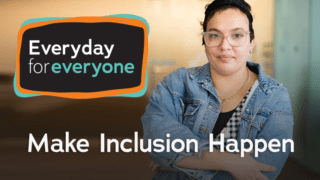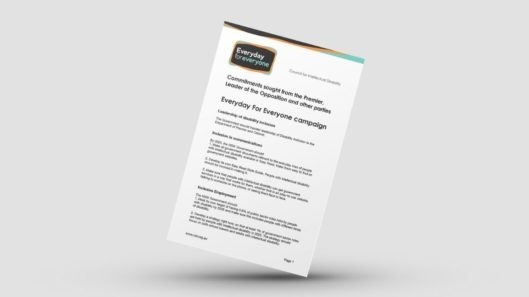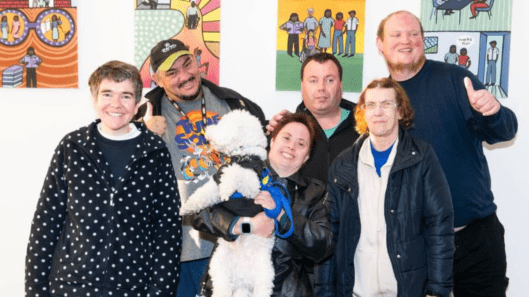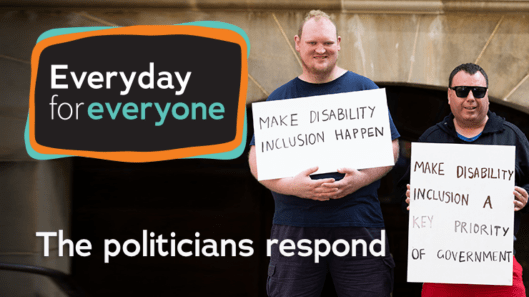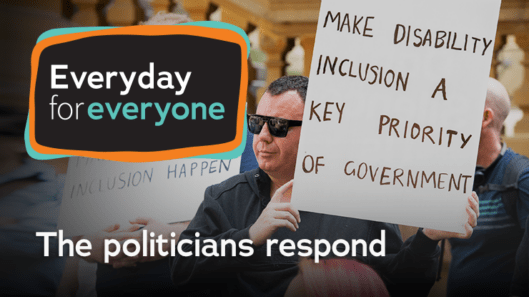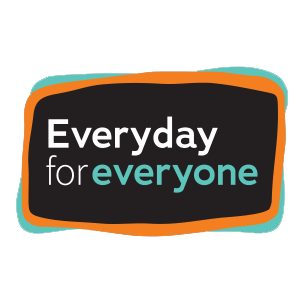
“I want to be part of the community, not just walk through it.”
– Michael Sullivan AM, Former Chair of CID
We all want to do everyday activities with confidence. But people with intellectual disability often face barriers.
A major commitment to action on disability inclusion by the NSW Government would knock down barriers. It would open up the community for people with intellectual disability.
Update – September 2024
In the leadup to the 2023 NSW election, we got responses to our campaign from the political parties.
The new Labor Government has acted on two key commitments that we had asked for. The Government has been working with CID to produce a NSW Easy Read Style Guide and has committed to using the Guide to put lots of NSW Government information into Easy Read in 2025.
Attorney-General Michael Daley delivered on his promise to set up a working group to advise the Government on reform of the outdated Guardianship Act. CID was represented on the working group which has now finished its report. CID is now pressing the Government to write a new Act.
CID continues our advocacy for action disability inclusion – information in Easy Read that is easy to find and easy to use, cognitive access to public transport, Government jobs for people with intellectual disability and much more!
Putting disability at the heart of government
Inclusive leadership
Right now, the Department of Communities and Justice (DCJ) are responsible for disability inclusion. This implies that disability is only an issue for social services to think about.
We think disability inclusion is much more important than that. It should be part of all decisions the government makes.
That’s why we’re asking the NSW Government to move leadership of disability inclusion to the Department of Premier and Cabinet (DPC).
CID says that disability inclusion is a big idea at the heart of government.
Transferring leadership for disability inclusion to DPC can make that big idea happen.
Want more information? Check out our government inclusion information sheet in Standard English (PDF) and Easy Read (PDF).
Inclusive communications
We all need information we can understand. This includes people with intellectual disability.
Getting information about government services can be challenging for everyone. Complicated web pages, new apps to download, and no one to talk to when you get stuck… for a person with intellectual disability, these things can make a difficult task impossible.
We need to make it easier for people to do everyday things like buying a train ticket or applying for a driver’s license or identity card.
We are asking the NSW Government to fix this problem by 2025:
- Provide Easy Read versions of all documents relevant to the lives of people with intellectual disability. Make them easy to find on government websites.
- Develop its own Easy Read Style Guide with input from people with intellectual disability.
- Make sure that people with intellectual disability can get government services in a way that works for them, whether that is an easy-to-use website, talking to someone on the phone, or seeing them face to face.
- Make a toll-free phone line available for people who need spoken information.
Want more information? Check out our communications information sheet in Standard English (PDF) or Easy Read (PDF).
Inclusive employment
Having a job means more than just having money. It also can bring independence, dignity and purpose.
People with intellectual disability who work are often employed by Australian Disability Enterprises (ADEs), which are segregated from the rest of community. The wages they receive can be as low as $2.50 per hour.
Very few people with intellectual disability have jobs in the NSW public service.
With the right support, people with intellectual disability can work in open employment in the community with real wages.
The NSW Government has an opportunity to be a leader in inclusive employment.
We are asking them to:
- Meet their own target of having 5.6% of public sector roles held by people with disability by 2025. This needs to include people with different kinds of disability.
- Develop a strategy so that at least 1% of public sector roles are held by people with intellectual disability in 2025. This strategy should focus on both school leavers and adults with intellectual disability.
The UN Convention on the Rights of Persons with Disability says that governments agree to employ people with disability in the public sector. This is one way to make sure their right to work is upheld.
Want more information? Check out our inclusive government employment information sheet in Standard English (PDF) or Easy Read (PDF).
Inclusive transport
We all need to be able to move around, attend events or appointments and participate in community life. People with intellectual disability want and need to do these things just like everyone else.
Navigating public transport is tricky. Which train do I take? When does the bus come? Where do I go to buy a ticket? What do I do if my service is cancelled? Finding the answer to these questions can be even harder if you have an intellectual disability… especially if you don’t have a smartphone to look up information or a credit card to pay at the Opal top-up machine.
A lot of work has been done to make transportation more accessible for people with other kinds of disability. People with intellectual disability should have the same opportunity.
As one of the CID Advocacy Group members said, “Transport is our ticket to freedom and the community.”
We are asking the NSW government to:
- Make all information about public transport accessible for people with disability. Use words and pictures that are easy to understand. See Inclusive Communications to learn more.
- Provide transport information in both printed and digital formats.
- Work with people with intellectual disability to design transport solutions that work for everyone.
- Sell Opal tickets at major transport hubs and stations, not just at shops.
- Train transport staff in disability awareness. This training should be the same across all providers.
- Support changes to the National Disability Standards for Accessible Public Transport to include cognitive access.
Want more information? Check out our transport information sheet in Standard English (PDF) or Easy Read (PDF).
How can I help?
Sign our petition and tell Premier Dominic Perrottet and Opposition Leader Chris Minns to Make Inclusion Happen.
More ways to help
-
Ask us to send you some postcards.
Give them to friends, neighbours and family to sign and send back.
Order your free postcards here or call 1800 424 065.
-
Phone, email and visit your local State MP (member of parliament).
Download the How to lobby your local MP guide in Standard English or the Easy Read Lobbying Guide
-
Phone and email the Premier, Dominic Perrottet.
Download the How to lobby the Premier guide in Standard English or the Easy Read Lobbying Guide
-
Phone and email the Leader of the Opposition, Chris Minns.
Download the How to lobby the Leader of the Opposition guide in Standard English or the Easy Read Lobbying Guide
Join our How to Lobby your Local MP sessions on Zoom
Campaign News
News from our Everyday for Everyone campaign



 1800 424 065
1800 424 065 
















